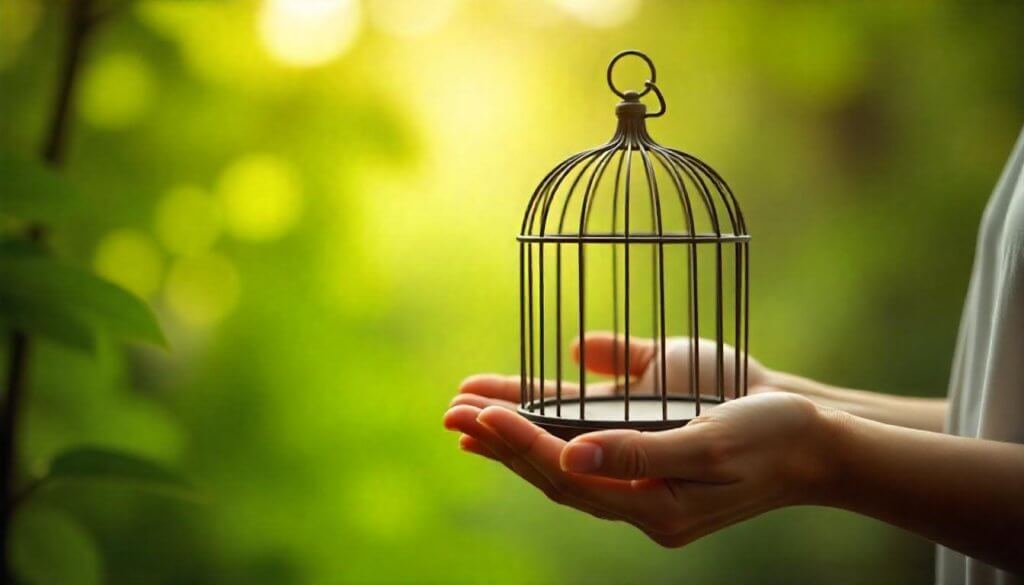
Introdução: A ascensão do drama relacional no final da década de 2020
As relações românticas modernas estão a enfrentar uma crise silenciosa. No período de 2025-2030, muitos casais relatam níveis crescentes de turbulência emocional e drama fabricado que vão muito para além dos desacordos normais. Surgiu uma tendência inquietante em que expressão emocional e conflitos acentuados tornam-se ferramentas para algumas mulheres controlo a dinâmica da relação. Estes padrões envolvem frequentemente uma intensidade emocional deliberada - explosões frequentes, "testes" da devoção de um parceiro, e ciclos de turbulência e reconciliação - como forma de chamar a atenção e influenciar o comportamento masculino. Embora este tipo de drama possa proporcionar tranquilidade ou excitação a curto prazo, tem um custo elevado. Este ensaio argumenta que a crescente dependência do caos emocional como tática de controlo é minar as relações modernascontribuindo significativamente para o aumento das taxas de divórcio e para a instabilidade dos agregados familiares. Pior ainda, corre o risco de transmitir padrões relacionais pouco saudáveis às gerações futurasA criança aprende a ver o drama e a manipulação como partes normais do amor. A análise que se segue combina conhecimentos psicológicos e padrões da vida real (retirados de comentários sobre relações contemporâneas) para mostrar como esta crise de controlo emocional está a acontecer - e porque é tão destrutivo para as famílias.
Um desejo biológico de intensidade emocional
Porque é que alguém querer drama na sua vida amorosa? Os dados psicológicos sugerem que muitas mulheres são inclinação biológica e psicológica para a intensidade emocional nas relações, mesmo que inconscientemente. Estudos de psicologia evolutiva indicam que, ao longo da história, as mulheres que conseguiam provocar fortes reacções emocionais nos parceiros masculinos (mesmo em caso de conflito) tinham mais probabilidades de obter proteção, recursos e compromisso. Ao longo de milénios, isto criou uma programação que faz com que as mulheres de hoje anseiam por intensidade emocional em vez de estabilidade. Em termos simples, a paz e a harmonia, embora agradáveis, não criam os mesmos sinais neuroquímicos de ligação no cérebro feminino que o conflito e o drama. Os momentos de turbulência - gritos, choros, reconciliações apaixonadas - desencadeiam recompensas bioquímicas e adrenalina que a psicologia das mulheres interpreta como intimidade e envolvimento.
Em contrapartida, uma relação calma e estável pode começar a parecer estranha vazio ou "subestimulante" para alguém que está ligado à intensidade. Os psicólogos descrevem que as mulheres em relações muito estáveis desenvolvem "cansaço da paz" - uma inquietação quando a vida se torna também pacífica. O seu sistema nervoso, adaptado aos altos e baixos emocionais, pode literalmente tornar-se aborrecido por uma parceria sem dramas. Em seguida cria inconscientemente a excitação de que a sua psique necessitamesmo que tudo estivesse a correr bem. É por isso que uma mulher parecerá por vezes mais feliz durante os períodos de turbulência na relação e mais insatisfeita durante os períodos de paz. A estabilidade que os homens trabalhar para fornecer pode ironicamente deixar a mulher a sentir-se desligado. Numa análise, "o que tu vives como sucesso na relação - harmonia e estabilidade sustentadas - ela vive como estagnação e morte emocional". Em suma, existe uma diferença fundamental entre os sexos no que respeita às necessidades emocionais: os homens procuram frequentemente o equilíbrio e a consistência, enquanto as mulheres (em média) procuram a intensidade e a variedade. Os homens querem resolver os problemas e regressar à calma, enquanto as mulheres "querem extrair o máximo de significado emocional" e pode prolongar ou ampliar os conflitos para o fazer.
Nada disto significa que as mulheres conscientemente gostam de lutar ou causar dor. Pelo contrário, estes comportamentos são normalmente motivados por impulsos inconscientes e sistemas de recompensa biológicos. O cérebro feminino recompensa ligação através do conflitoA falta de intensidade emocional é de tal forma sentida como uma falta de amor. Como disse um comentador, "A paz torna-se um castigo e o drama uma recompensa" para muitas mulheres cujos cérebros foram condicionados a esperar turbulência emocional. Esta ligação biológica ajuda a explicar porque é que uma mulher pode começar uma briga "sem motivo" - o seu subconsciente está a procurar a emoção faísca e o envolvimento que vem com o conflito. É um instinto perverso que dá prioridade a sentir algo (até mesmo raiva ou lágrimas) em vez de não sentir nada. Infelizmente, este instinto prepara o terreno para um ciclo de viciante drama numa relação.
Dependência emocional e o ciclo do drama
A intensidade emocional pode tornar-se literalmente viciante. Os psicólogos observam que o ciclo de conflito e reconciliação numa relação volátil pode ativar as mesmas vias de recompensa que as drogas ou o jogo. Cada luta inunda o corpo com hormonas do stress e adrenalina, e cada momento de reconciliação ou ternura liberta alívio e neurotransmissores positivos. Com o tempo, as mulheres, em especial, podem tornar-se dependente destes altos e baixos químicos. Em suma, o drama torna-se uma droga. Ela pode não se aperceber, mas "o mecanismo de tranquilização torna-se viciante porque proporciona um alívio temporário da ansiedade crónica da relação". Depois de instigar um conflito e ver o seu parceiro reagir emocionalmente (provando que ele se preocupa), a sua ansiedade em relação à relação diminui brevemente - dando-lhe um pancada de alívio e até contentamento. Uma análise descreve de forma arrepiante "a dinâmica enlouquecedora em que ela parece mais feliz depois de o fazer sentir miserável" - A raiva e as lágrimas dela não eram o verdadeiro objetivo, mas sim a sua reação emocional. Uma vez que a sua raiva tenha comprovado o seu investimento nela, ela pode relaxar, tendo obtido a validação que a sua psique desejava.
Este padrão pode criar um ciclo de feedback tóxico. Em vez de construir uma verdadeira segurança através de um afeto calmo, a mulher "desenvolve um padrão de criação de insegurança através do conflito, sentindo depois alívio quando as suas reacções emocionais comprovam o seu investimento". Em termos psicológicos, trata-se de uma forma de reforço intermitenteum dos mais poderosos factores de dependência. O reforço intermitente significa não obter feedback positivo de forma consistente, mas em ciclos imprevisíveis - o que, paradoxalmente, reforça a ligação. A investigação sobre o comportamento humano confirma que um padrão de recompensa instável (altos e baixos) cria uma dependência muito mais forte do que uma dependência estável e sempre positiva. Nas relações, isto traduz-se no facto de um parceiro ser "quente e frio"A mulher é uma mulher de família: por vezes carinhosa e atenciosa, outras vezes distante ou cruel. Do ponto de vista do homem, ele nunca sabe qual a versão dela que vai ter. Mas essas fases ocasionais de calor e ternura são suficientes para o manter viciado - ele está sempre à procura do próximo ponto alto. Do ponto de vista da mulher, ela também está viciada no ciclo: as brigas aumentam as suas emoções até um nível febril, e a resolução emocional (ou as desculpas dele) dão um choque calmante que parece intimidade.
Vários especialistas em relações observaram que muitas mulheres apresentam este ciclo exato de recompensa intermitente com os seus parceiros, de forma intencional ou não. Como explica um analista, "A forma mais insidiosa de as mulheres castigarem os homens que amam é através do reforço intermitente. Você dá-lhe altos incríveis quando ele se comporta da maneira que você quer e baixos esmagadores quando ele não o faz. Isto cria uma dinâmica semelhante a um vício em que ele se torna psicologicamente dependente da sua aprovação.". Fundamentalmente, os comportamentos que ela recompensa ou castiga são muitas vezes pouco têm a ver com questões reais ou com o carácter do homem - baseiam-se no seu estado emocional momentâneo e na necessidade inconsciente de manter o controlo. Por outras palavras, o drama é fabricado para satisfazer as suas necessidades emocionais e não para resolver problemas reais. O resultado é uma relação que funciona como uma montanha-russa: calmo e carinhoso num dia, tempestuoso e punitivo no outro, pedalando sem parar. Ambos os parceiros podem tornar-se emocionalmente dependentes da turbulência de formas diferentes. A mulher persegue os sentimentos intensos que a fazem sentir vivo e tranquilizada, enquanto o homem, agora condicionado, persegue ansiosamente a aprovação dela para evitar o próximo "baixo". O cenário está montado para uma dinâmica profundamente doentia, alimentada pelo drama.
Tácticas de curto prazo: Testes emocionais e drama fabricado
Como é que estes padrões se manifestam no dia a dia? As mulheres que recorrem ao drama emocional como mecanismo de controlo envolvem-se frequentemente em tácticas recorrentes - alguns conscientes, muitos inconscientes - para criar a intensidade desejada ou para "comboio" os seus parceiros. Estes comportamentos vão desde explosões súbitas a jogos mentais subtis. Aqui estão algumas das tácticas de curto prazo mais comuns utilizadas para gerar drama e testar a devoção de um parceiro:
- Recompensa e castigo intermitentes: A mulher alterna entre o calor e a frieza para condicionar o comportamento do parceiro. Por exemplo, quando ele cumpre com os seus desejos, ela dá-lhe muito afeto, mas quando não o fazA pessoa que se sente mal, torna-se distante, crítica ou afasta-se do amor. Esta "calendário de castigos" A mulher que o ama treina-o a andar sobre cascas de ovos, procurando constantemente agradá-la para voltar a ganhar afeto. Com o tempo, ele pode passar de um homem confiante para "um ansioso em busca de aprovação," uma transformação que, ironicamente, mata a atração que os uniu.
- Jogos de inveja e crises fabricadas: Outra tática é fabricar cenários que estimulem o seu ciúme ou instinto de herói. Ela pode mencionar o interesse de outros homens por ela ou namoriscar com rapazes nas redes sociais, só para provocar uma reação. Ela também pode criar drama a partir do nada - arranjar uma discussão sobre um assunto trivial ou retirar o afeto até ele a perseguir. Estes crises fabricadas têm um objetivo psicológico: são "provar que se preocupa o suficiente para lutar pela relação" e criar o entusiasmo que a faz sentir-se desejada. No entanto, como alertam os treinadores de relacionamentos, isso também mostra ao homem que estar com ela significa aceitar um drama desnecessário e que não valoriza verdadeiramente a paz e a estabilidade.
- Provocações passivo-agressivas: Nem todos os dramas se traduzem em gritos ou lutas óbvias; alguns deles são indirectos e dissimulados. As mulheres que o fazem mostrar-se aborrecido mas recusar-se a explicar porquê, ou dar o tratamento de silêncio enquanto "a castigar-te por não lhe leres a mente." Pode definir expectativas tácitas e ficar zangada quando não as cumpre - por exemplo, esperar que note que ela está de mau humor sem que lho digam e depois criticá-lo por não a confortar "corretamente". Esta situação cria um duplo dilema para o homem. Ela pode afirmar que não há nada de errado e, ao mesmo tempo, minar a sua paz de espírito através de insinuações subtis e de um comportamento frio. Como diz uma descrição, "Quando tentamos resolver o problema aparente, ela nega que exista um problema e, ao mesmo tempo, castiga-nos por não o resolvermos". Este drama passivo-agressivo mantém-no ansioso e hipervigilanteO seu pai, que está constantemente a monitorizar o humor dela para a próxima armadilha. Ele descobre que qualquer momento pode transformar-se num conflito sem aviso prévioO seu filho está a ser treinado para suprimir as suas próprias necessidades e sentimentos para não a despoletar.
- Conflito aberto como teste de lealdade: Muitas mulheres instigar brigas intencionalmente para avaliar o investimento emocional do seu parceiro. Este é o clássico "teste" comportamento. Ela pode acusá-lo de não se importar, explodir por causa de uma questão menor ou até desencadear uma discussão por aborrecimento, tudo para ver como ele reage. A lógica é primitiva mas eficaz: se ele morder o isco e se zangar ou responder apaixonadamente, isso significa que ainda se preocupa; se ele se mantiver calmo ou distante, ela interpreta isso como se ele já não a amasse. Os especialistas em relações observam que "As mulheres usam o conflito para testar a força do seu investimento emocional... Se continuar a ficar zangado quando ela o provoca, isso prova que ainda se importa. Se permanecer calmo e indiferente, isso sugere que está a desistir". Assim, ao provocar ciúme ou raiva, ela está realmente a verificar "Será que ainda sou importante para ele?" Na sua mente, as lágrimas e os gritos são muitas vezes prova do amor - uma inversão perigosa que recompensa um comportamento pouco saudável. Esta dinâmica explica porque é que uma mulher pode realmente parecer mais relaxado e afetuoso depois de uma grande discussão: em algum nível, a luta tranquilizado que o seu homem ainda está emocionalmente ligado a ela.
- Gaslighting e Distorção da Realidade: Em casos mais extremos (frequentemente com personalidades narcisistas), uma mulher pode usar iluminação artificial como parte do seu arsenal dramático. Isto envolve manipular a perceção que o parceiro tem da realidade - negando coisas que ela claramente disse ou fez, distorcendo factos e fazendo-o sentir-se louco por a questionar. Por exemplo, ela pode insistir que um incidente não aconteceu como ele se lembra ou que seu As reacções são "exageradas" quando, na realidade, foi ela que causou o problema. Com o tempo, esta guerra mental faz com que o homem duvide de si próprio e dependa da versão dela dos acontecimentos. O gaslighting alimenta o drama ao garantir que mesmo realidade objetiva torna-se um ponto de discórdia, mantendo a relação num estado constante de confusão e tensão emocional. É uma tática de controlo que mantém o drama sempre em lume brando - o homem nunca tem a certeza da verdade e, por isso, nunca pode resolver firmemente qualquer conflito. Ele acaba por se sentir "como se estivessem a ficar loucos"e, muitas vezes, renuncia ao seu próprio juízo para manter a paz. Isto cede controlo total da narrativa para o parceiro que iniciou a dramatização.
Cada uma destas tácticas produz resultados a curto prazo para a mulher que as emprega. Produzem de forma fiável as reacções emocionais ou a atenção que ela procuraQuer seja o namorado a pedir desculpa, a mudar o seu comportamento, a lutar para a reconquistar, ou simplesmente a ficar ali, extasiado e concentrado nela, no meio do caos. A um nível primordial, funciona: "o conflito corta todas as outras distracções e obriga-o a concentrar-se exclusivamente nela," fazer efetivamente o combate "um instrumento de gestão da atenção em vez de uma verdadeira comunicação". De facto, muitas mulheres aprendem que o facto de serem agradáveis ou calmas não lhes dá atenção, ao passo que criar um problema imediatamente atrai a atenção e o esforço masculino. Na economia da atenção de uma relação, a atenção negativa é muitas vezes melhor do que a falta de atenção. Como uma análise observou sucintamente, "a mulher que cria drama recebe uma atenção intensa e um investimento emocional," enquanto a mulher descontraída é considerada um dado adquirido. Assim, numa perspetiva puramente de curto prazo, o teatro é uma estratégia eficaz para as mulheres se sentirem no controlo do clima emocional da relação. Ao iniciar o drama, ela estabelece os termos do compromisso - quando as lutas acontecem, até onde vão e quais são as consequências. O homem é mantido perpetuamente a reagir a ela o que cimenta o seu domínio psicológico (por enquanto).
Consequências a longo prazo: Isolamento masculino e rutura da relação
Embora o impacto a curto prazo destes comportamentos possa recompensar o instigador do drama, o as consequências a longo prazo são devastadoras. Uma relação não pode prosperar - e pode nem mesmo sobreviver - sob um regime de constante agitação emocional e manipulação. Com o tempo, o parceiro masculino numa tal dinâmica sofre tipicamente uma de duas transformações: ou ele se torna uma concha emocionalmente quebrada de si mesmo, ou chega a um ponto de rutura e sai. Ambos os resultados são um mau presságio para a longevidade e a saúde da relação.
Em muitos casos, a primeira fase é um processo gradual erosão da confiança, da felicidade e da vontade de se envolver do homem. Sujeito a testes contínuos, explosões e mudanças de objectivos, ele aprende que nada do que faz é suficiente. Como um observador descreveu, "o homem que se sente constantemente avaliado em relação a padrões invisíveis acabará por deixar de tentar cumpri-los". Com efeito, se cada pequeno lapso ou ação independente da sua parte desencadeia um episódio dramático, o homem adapta-se retirar-se para uma concha defensiva. Ele começa a andar sobre cascas de ovos, censurando as suas palavras e acções para evitar o próximo ataque dela. Ele suprime partes da sua personalidade que costumavam fazer com que ele interessante - talvez abandone passatempos, evite ver amigos ou deixe de expressar opiniões - tudo por medo de "desencadeando as suas reacções imprevisíveis". De facto, ele é "treinado fora das qualidades que fizeram com que [ela] o quisesse em primeiro lugar". O homem confiante, divertido ou atencioso pelo qual ela se sentiu inicialmente atraída desaparece, sendo substituído por um homem ansioso que agrada às pessoas e que vive apenas para a manter feliz. Infelizmente mata a própria atração e respeito que os uniu. Como diz a transcrição de um treinador de relações sem rodeios, "O homem confiante que não precisava da sua aprovação era atraente. O homem ansioso que vive para a sua validação não é.". Ao tentar seguro o seu parceiro através do drama e do controlo, a mulher acaba por destruindo a sua atração e individualidade - uma vitória de Pirro.
Para o homem, esta dinâmica também gera profundas ressentimento e exaustão emocional. Ninguém consegue aguentar viver num estado de alerta constante ou sentir-se culpado por tudo. Mesmo que cumpra durante algum tempo, por dentro pode começar a desprezar a situação - e talvez até desprezar ele próprio por o tolerar. O ressentimento acumula-se "como uma bomba-relógio". Eventualmente, ele "explode numa de duas maneiras: Ou se torna ressentido e passivo-agressivo, ou recupera a confiança e percebe que não quer estar com alguém que exige que ele se diminua para a manter feliz".. No primeiro cenário (retaliação passiva-agressiva), a relação transforma-se num tique-taque tóxico: ambos os parceiros se atiram à parede, se bloqueiam ou agem num ciclo de hostilidade mútua. No segundo cenário (o homem recupera a confiança), ele decide basta. Muitas vezes isto significa terminar a relação para salvar a sua própria saúde mental. Quando um homem reconhece que se perdeu e que "manter a felicidade [dela]" se tornou mais importante do que o seu próprio bem-estar, isso pode desencadear uma chamada de atenção. Se ele ainda tiver alguma opção saudável ou respeito por si próprio, ele acabará por se ir embora.
Não é de estranhar, portanto, que o drama crónico está fortemente ligado a separações e divórcios. Homens que têm outras opções "não vão tolerar esta dinâmica durante muito tempo. Escolherão a mulher que melhora a sua vida e não a que a complica".. Independentemente da atração inicial, uma mulher que cria constantemente dramas para se sentir amada "acaba por destruir o próprio desejo que está a tentar gerar." Em termos mais simples: se todas as lutas forem um teste de amor, acabarão por falhar. O parceiro que está a ser testado ou se esgota emocionalmente ou decide que o preço de admissão a esta relação é demasiado elevado. Podemos ver este padrão refletido em tendências mais amplas. Nos últimos anos, os observadores notaram que as relações estão a quebrar-se a um ritmo alarmantee que os homens, em especial, estão a optar por sair de uniões altamente conflituosas. De acordo com algumas medidas, as taxas de divórcio no século XXI permanecem em máximos históricos ou perto deles, depois de os dados serem devidamente ajustados. Por exemplo, um estudo exaustivo concluiu que as taxas de divórcio ajustadas à idade nos EUA têm ressuscitado 40% desde 1980 (contrariamente à crença de que o divórcio tinha diminuído). E, globalmente, um número crescente de crianças está a viver a instabilidade familiar devido a separações parentais ou casamentos nunca formados. Embora nem todos os divórcios sejam causados pelo tipo de manipulação emocional que estamos a discutir, é evidente que conflito crónico e falta de segurança emocional são os principais factores que contribuem para o fracasso das relações. Um agregado familiar não pode prosperar quando um dos parceiros se sente constantemente atacado ou quando a confiança é continuamente corroída por crises fabricadas.
Outra consequência a longo prazo digna de nota é o impacto sobre saúde mental masculina. Os homens nestas dinâmicas sofrem muitas vezes, em silêncio, de stress, ansiedade e até depressão. Foi-lhes ensinado (implicitamente) que qualquer expressão da sua própria angústia será virada contra eles ou ignorada. Com o tempo, isto pode levar a um entorpecimento emocional ou a uma condição por vezes chamada "síndroma do marido que se vai embora," em que o homem fica tão emocionalmente esgotado (depois de anos de tentativas e fracassos para agradar à mulher) que um dia se vai embora sem olhar para trás. A perda de respeito - de ambas as partes - torna-se irreparável. Ela já não respeita o homem que conseguiu dominar, e ele já não respeita um parceiro que aparentemente só trouxe caos e dor. O divórcio ou a separação torna-se o único caminho para a sanidade individual.
Em resumo, as "vitórias" a curto prazo de controlar um parceiro através do drama transformam-se em perdas a longo prazo. O fissuras nos alicerces da relação sob a tensão de um conflito constante. O amor dissolve-se em ressentimento. A comunicação transforma-se num campo minado. E, em última análise, muitas destas relações acabam por ser infelizes ou por se desmoronar completamente. A tendência para o aumento dos divórcios e das separações no final da década de 2020 pode ser parcialmente explicada por este fenómeno: os casais estão cada vez mais presos a dinâmicas emocionais disfuncionais que simplesmente não conseguem sustentar uma parceria ou uma vida familiar saudável. Quando os jogos de controlo emocional substituem a compreensão e o respeito genuínos, o resultado é um desgosto e lares desfeitos.
Validação e ego: o combustível das redes sociais
O que está a provocar este aparente aumento das relações dramáticas? Parte da resposta pode estar na nossa cultura de validaçãoespecialmente a influência das redes sociais e a evolução das normas de género. As mulheres contemporâneas são bombardeadas com validação externa de uma forma que nenhuma geração anterior experimentou. Hoje em dia, uma jovem pode publicar uma selfie e, em poucos minutos, receber centenas de gostos e comentários lisonjeiros de admiradores em linha. Este fluxo constante de aplausos digitais pode facilmente inflacionar o ego de uma pessoa e distorcer as suas expectativas relativamente a relações reais. "Os egos das mulheres modernas são em grande parte construídos com base na validação das redes sociais". observa um comentador psicológico. "Gostos, comentários, seguidores e atenção de homens que nunca irão conhecer - esta validação digital cria uma bolha psicológica onde as mulheres acreditam que são mais desejáveis do que realmente são.". Naquela bolha, a atenção torna-se abundante mas também superficial: há sempre uma nova dose de elogios à distância de um toque de dedo.
Este ambiente gera uma dependência da validação e um sentido de direito distorcido. Quando a autoestima de uma mulher é constantemente sustentada por likes no Instagram e DMs sedentas, ela pode vir a esperar adoração e entusiasmo incessantes também na sua relação na vida real. O amor comum e comprometido pode começar a parecer insuficientemente estimulante. A calma da vida doméstica não pode competir com a dopamina da atenção viral. As redes sociais também fomentam comparações irrealistas - ver os melhores momentos de outros casais e, assim, elevar os padrões do que um parceiro deve proporcionar emocionalmente. Se a sua própria relação se sente mundano durante uma semana, uma mulher pode perguntar-se: "Passa-se alguma coisa? As outras pessoas parecem tão felizes e apaixonadas online". Assim, ela pode provocar o drama só para imitar a intensidade que ela supõe que os outros têm, ou para se assegurar de que a sua relação tem incêndio nele.
Além disso, o ego inflacionado das redes sociais pode fazer com que uma mulher seja menos tolerante em relação a quaisquer deficiências do seu parceiro. Ela pode pensar inconscientemente: "Tenho milhares de homens a validarem-me online; não tenho de aturar nada que me desagrade." Esta mentalidade pode alimentar o tipo de comportamento exigente ou manipulador que descrevemos anteriormente. Não é necessariamente que ela planeie conscientemente ser cruel - pelo contrário, inconscientemente "seguir guiões" que lhe dizem para extrair o máximo de valor dando o mínimo de retorno. Séculos de condicionamento evolutivo (recompensando as mulheres que conseguiam obter mais recursos e atenção) combinados com o condicionamento cultural moderno (validação externa constante) podem produzir o que vemos atualmente: uma geração de mulheres com uma autoestima elevadíssima e pouca tolerância a compromissos. Uma análise salienta que este facto é frequentemente não não é motivado por intenções maliciosas, mas por uma programação enraizada: "A maioria das mulheres não decide conscientemente ter direitos, ser exigente ou manipuladora. Estão a seguir guiões inconscientes que lhes dizem para extrair o máximo de valor dos homens, ao mesmo tempo que oferecem um investimento mínimo em troca.". Os meios de comunicação social amplificam esses guiões, sussurrando sempre ao seu ego que ela poderia fazer melhor, que ela merece mais.
O resultado nas relações é que o drama pode ser desencadeado por muito pouco. Um pequeno desentendimento ou um período de rotina normal pode ser interpretado por uma mulher com o ego inflado como uma falha grave da parte do homem: ele não me está a apreciar o suficiente, eu dou-lhe uma lição. No passado, a comunidade e a família podiam moderar esses impulsos - os mais velhos ou os pares encorajavam os casais a resolver os problemas com calma. A cultura atual, no entanto, aplaude muitas vezes a mulher que "não aceita disparates" de um homem, mesmo que ela própria criou o disparate. Por vezes, os meios de comunicação social populares até romantizam o tropo da "namorada louca" como sendo apaixonado e ardente. Tudo isto valida a utilização do drama como um meio para atingir um fim. Além disso, quando o ego de uma mulher é desafiado - digamos, o seu parceiro não se entusiasma com a sua última selfie ou questiona o seu comportamento - ela pode retaliar com drama ainda mais intenso para reafirmar o controlo. Como observa um perito, quando se deixa de alimentar o ego inflacionado de uma mulher, "ela vai ripostar usando todas as armas psicológicas... Vai criar cenários dramáticos, fabricar crises e usar as lágrimas para o fazer sentir culpado por não lhe dar a validação que ela deseja".. Por outras palavras, as redes sociais não só inflacionaram os egos, como também armaram as mulheres com uma justificação para desencadear a manipulação emocional sempre que o seu sentido de auto-importância é minimamente perfurado.
Este dependência de validação piora o ciclo que descrevemos. Um parceiro que é constantemente validado pelo mundo exterior pode sentir menos necessidade de nutrir uma intimidade genuína em casa. Se a sua relação vacilar devido ao drama que ela provoca, pode ganhar simpatia (e mais validação) ao apresentar o homem como o vilão aos seus amigos ou seguidores. Em casos extremos, a economia da atenção das redes sociais significa que uma separação ou uma discussão pode ser transformada num drama público para ganhar influência, incentivando ainda mais a teatralidade emocional. A conclusão é que o nosso contexto cultural - o dilúvio das redes sociais, as aplicações de encontros que oferecem alternativas infinitas e as narrativas de empoderamento feminino que, por vezes, podem ser mal interpretadas como nunca se comprometa, ponha-se sempre em primeiro lugar - deitou gasolina no fogo do drama das relações. Tem normalizou a procura constante de picos emocionais e desvalorizou o valor do respeito mútuo e constante. Isto faz com que as relações saudáveis e pouco conflituosas pareçam "aborrecidas" para alguns e, ironicamente, está a empurrar mais mulheres (e homens) para comportamentos que sabotam a estabilidade e o amor que realmente procuram.
Falha geracional: transmissão de padrões pouco saudáveis
Talvez o aspeto mais alarmante desta tendência seja o facto de impacto nas crianças e nas gerações futuras. Quando um agregado familiar é dominado por conflitos e manipulação emocional, os efeitos vão muito para além do casal - moldam a compreensão da próxima geração sobre o amor e a normalidade. As crianças que crescem a ver a mãe a criar dramas ou a testemunhar os pais em constante agitação estão efetivamente a ser treinados nesses mesmos padrões. Aprendem, implicitamente, que as relações íntimas são campos de batalha, que o amor é provado pela dor e pela raiva e que quem grita mais alto leva a melhor. Estas lições podem marcar a psique de uma criança e prepará-la para dificuldades nas suas próprias relações adultas.
Em muitos agregados familiares instáveis do final da década de 2020, as mães são o principal ou único progenitor (muitas vezes devido ao facto de o pai se ter retirado ou abandonado devido à dinâmica que discutimos). De facto, apenas cerca de 60% das crianças americanas vivem atualmente com os seus pais biológicos casadosO que significa que cerca de 40% vivem em situações de monoparentalidade ou de padrasto ou madrasta - uma taxa de instabilidade familiar que só fica atrás de um outro país do mundo desenvolvido. Os cientistas sociais chamam a esta prevalência de famílias desfeitas ou nunca formadas um "grande problema de saúde pública para as crianças". A razão é clara: as crianças de lares cronicamente instáveis ou em situação de grande conflito enfrentam uma série de desafios. A investigação documentou que as crianças expostas ao divórcio ou a conflitos interparentais constantes correm maiores riscos de dificuldades académicas, problemas de comportamento e perturbações emocionais. É mais provável que sofram de depressão, ansiedade e problemas de gestão da raiva, tendo sido essencialmente criadas num ambiente de perpétua volatilidade emocional.
Talvez o mais trágico seja o facto de estas crianças irem muitas vezes para repetem o ciclo nas suas próprias vidas. Os estudos indicam que "os filhos de pais divorciados ou separados têm mais probabilidades de viver a sua própria instabilidade familiar" quando crescerem. Por outras palavras, as crianças que vêem os pais separarem-se (ou vivem num drama incessante) são estatisticamente mais propensas a relações instáveis e a separações na idade adulta. Isto faz sentido intuitivamente: tendemos a modelar o que observamos. Um rapaz que cresce com uma mãe muito dramática pode interiorizar um de dois guiões desadaptativos - pode tornar-se demasiado submisso e avesso a conflitos, essencialmente espelhando o papel passivo do pai, ou pode desenvolver uma gatilho temperar-se, acreditando que as relações entre homens e mulheres são inerentemente conflituosas. Isto não é um bom presságio para o seu futuro casamento. Uma rapariga criada a ver a mãe usar a manipulação emocional pode, por sua vez, adotar essas tácticas com os seus parceiros, tendo aprendido que é assim que uma mulher mantém o poder ou controla o amor de um homem. Mesmo que ela despreze a forma como a mãe se comportava, pode subconscientemente levar esses padrões para a frente. Por outro lado, pode ser que ela se desvie para o outro lado e tolere os abusos dos parceiros, pensando que o caos emocional faz parte do amor, porque foi tudo o que ela conheceu. Assim, o ciclo perpetua-se: lares instáveis tendem a gerar outra geração de lares instáveis.
É importante notar que não nem todas as crianças destas origens estão condenadas - muitas são resistentes e crescem determinadas a ter relações mais saudáveis do que as dos seus pais. Mas mesmo as mais resistentes relatam frequentemente recordações dolorosas da sua educação: andar em bicos de pés à volta dos humores da mãe, sentir-se responsável por apaziguar os conflitos ou fazer de árbitro entre pais em conflito. Estas experiências podem deixar marcas emocionais profundas. A nível social, se os padrões actuais se mantiverem, enfrentamos um futuro em que a instabilidade emocional nas relações torna-se normalizada. Os rapazes podem decidir que não vale a pena casar ou comprometer-se se esperam um drama interminável (algumas tendências já mostram uma diminuição das taxas de casamento e um aumento do número de homens que se afastam do envolvimento romântico). As mulheres jovens, na falta de modelos positivos de regulação emocional feminina, podem inclinar-se para o único modelo que viram - utilizando lágrimas, ameaças e birras como ferramentas de comunicação. O resultado é um ciclo auto-reforçado de comportamento disfuncional nas relações, transmitido como um vírus intergeracional.
Do ponto de vista comunitário, o proliferação de famílias monoparentais devido a separações dramáticas é também uma preocupação. Não se trata de menosprezar as mães solteiras, mas de sublinhar que, em muitos casos, a os mesmos padrões que afastaram o pai podem continuar a verificar-se em casa. As crianças recebem então 100% A mãe, que pode ter dificuldades em manter o autocontrolo emocional ou que, conscientemente, fala mal do pai que partiu, perde a sua influência emocional. Sem a influência estabilizadora de uma figura paterna calma, não há contrapeso para o comportamento da mãe. Em alguns casos, os filhos mais velhos (especialmente os filhos) podem tornar-se cuidadores emocionais substitutos da mãe, distorcendo ainda mais a dinâmica pai-filho. A casa pode girar em torno da montanha russa emocional da mãe, ensinando às crianças que tudo na vida é reativo a ela sentimentos. Estas crianças podem ressentir-se dela ou identificar-se demasiado com ela, mas de qualquer forma, isso distorce o seu desenvolvimento de um "eu" saudável e de expectativas de relações saudáveis.
Em resumo, o as consequências de uma relação dramática estendem-se muito para além do casal envolvido. Está a plantar sementes de disfunção na próxima geração. Arriscamo-nos a criar rapazes e raparigas que perpetuam o ciclo de abuso emocional e volatilidade, ou que carregam feridas profundas que dificultam a sua capacidade de criar confiança e estabilidade com os outros. O aumento de famílias instáveis e de pais divorciados/separados já foi associado a taxas mais elevadas de vários problemas em crianças e adolescentes. Se não quebrarmos este ciclo, veremos essas crianças crescerem para reproduzir os únicos padrões que conhecem, e o ciclo de instabilidade familiar, impulsionado pelo drama, continuará inabalável.
Conclusão
O final da década de 2020 trouxe avanços notáveis em termos de tecnologia e progresso social, mas à porta fechada, um padrão regressivo afecta muitas das relações modernas. O drama emocional exacerbado - utilizado como instrumento de controlo ou de ligação - está a revelar-se um assassino silencioso do romance e da estabilidade familiar. O que começa como a busca de uma mulher por envolvimento emocional e segurança através do conflito, termina como um cenário de perdaO homem é psicologicamente agredido ou afastado, a mulher fica insatisfeita e sozinha e as crianças apanhadas no meio sofrem as consequências. A tendência de as mulheres usarem o caos fabricado para testar o amor ou dominar uma relação não é uma forma de fortalecimento ou de "paixão", como alguns podem afirmar - é profundamente destrutivo. Corrói as próprias bases da confiança, do respeito e do cuidado mútuo que as relações exigem para sobreviver. Cada "vitória" a curto prazo alcançada pelo drama (seja atenção, uma concessão do parceiro ou um aumento momentâneo do ego) planta as sementes para o colapso a longo prazo dessa relação.
Como já vimos, esta tendência comportamental é contribuindo significativamente para o aumento dos divórcios e dos lares instáveis. É fácil atribuir todos os fracassos das relações a mudanças sociais mais amplas, mas temos de reconhecer o papel dos padrões de comportamento individuais e da dinâmica psicológica. A crise de controlo emocional aqui descrita - em que o amor é constantemente provado pelo conflito - é uma peça importante do puzzle. A menos que estes padrões sejam reconhecidos e abordados, os casais continuarão a quebrar sob tensão e a próxima geração aprenderá todas as lições erradas sobre o amor. As relações saudáveis e duradouras não podem ser construídas sobre uma base de testes perpétuos, explosões emocionais e manipulação. Exigem aquilo que a nossa cultura atual frequentemente subestima: estabilidade emocional, empatia, comunicação aberta e respeito mútuo.
Se há uma nota de esperança, é o facto de a consciencialização ser o primeiro passo para a mudança. Alguns homens estão a aprender a estabelecer limites e a recusar-se a alinhar em dramas destrutivos, e algumas mulheres estão a aprender a compreender as inseguranças que estão na origem do seu comportamento e a procurar saídas mais saudáveis. Os terapeutas e educadores estão a dar cada vez mais ênfase à inteligência emocional e às competências de resolução de conflitos para os casais. Mas a mudança também tem de ser cultural: temos de deixar de glamorizar os comportamentos tóxicos das relações e começar a revalidar a importância da estabilidade e do respeito no romance. Os riscos são elevados. O custo de não mudar é medido não apenas em corações partidos, mas em famílias desfeitas e crianças marcadas. No final, nenhuma quantidade de gostos nas redes sociais ou picos emocionais momentâneos pode substituir a profunda realização de uma parceria estável e amorosa. Está na altura de quebrar o vício do drama - para bem das nossas relações actuais e das gerações que herdarão o nosso exemplo.













